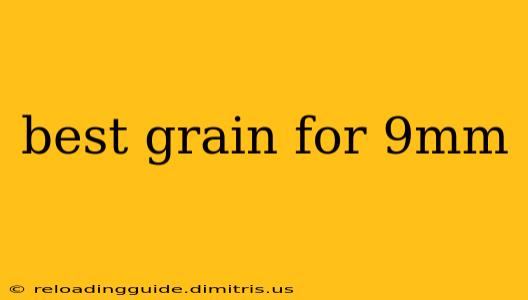Choosing the right grain bullet for your 9mm pistol is crucial for optimal performance. The "best" grain weight isn't a one-size-fits-all answer; it depends heavily on your specific firearm, intended use (self-defense, target practice, competition), and personal preferences. This guide will delve into the factors influencing grain weight selection, exploring popular options and helping you find the sweet spot for your 9mm.
Understanding Grain Weight and its Impact
Grain weight refers to the mass of the bullet, measured in grains (7,000 grains = 1 pound). Heavier bullets generally offer:
- More knock-down power: Greater momentum translates to more energy transferred to the target.
- Flatter trajectory: Less bullet drop over distance, making long-range accuracy easier.
- Reduced recoil (sometimes): While counterintuitive, heavier bullets can sometimes lead to less felt recoil in certain guns, although this is heavily dependent on the load and the gun itself.
Lighter bullets tend to:
- Higher velocity: They accelerate faster with the same powder charge, leading to a faster muzzle velocity.
- Less recoil (often): Generally, lighter bullets generate less felt recoil.
- Better penetration (sometimes): A smaller, faster bullet can sometimes penetrate deeper than a slower, heavier bullet, though this is highly dependent on bullet construction.
Popular 9mm Grain Weights and Their Applications
Here's a breakdown of common 9mm grain weights and their typical applications:
115 Grain:
- Pros: High velocity, relatively low recoil, good for range practice and competition. Often the most affordable option.
- Cons: Can lack stopping power compared to heavier rounds in self-defense situations.
124 Grain:
- Pros: A good balance of velocity, accuracy, and stopping power. Popular choice for self-defense and general use.
- Cons: Slightly higher recoil than 115 grain, might not be ideal for all shooters.
147 Grain:
- Pros: Excellent for self-defense; known for reduced recoil and good expansion. Often preferred for its subsonic capabilities.
- Cons: Lower velocity compared to lighter options.
Factors to Consider When Choosing Grain Weight
Beyond the inherent characteristics of different grain weights, several other factors play a vital role:
Your Pistol:
Different 9mm pistols have different barrel lengths and designs, influencing how well certain grain weights perform. Consult your firearm's manual for recommendations.
Intended Use:
- Self-defense: Prioritize stopping power and reliable expansion. Heavier grain weights (124-147 grains) are typically favored, though the bullet construction is just as important, if not more so.
- Target practice: Lighter grain weights (115-124 grains) are often preferred due to their lower cost and reduced recoil, allowing for more practice without fatigue.
- Competition: This is highly dependent on the specific rules of the competition, but generally, a balance of accuracy, velocity and reliability is crucial.
Personal Preference:
Ultimately, the best grain weight is the one that you shoot most accurately and comfortably. Experiment with different options at the range to find what works best for you.
Bullet Construction: Beyond Grain Weight
While grain weight is a crucial factor, remember that bullet construction is equally important. Factors like bullet type (FMJ, JHP, etc.), material, and design significantly influence terminal performance (how the bullet behaves upon impact).
Conclusion: Experimentation is Key
There's no single "best" grain for 9mm. The ideal choice depends on a combination of your firearm, intended use, and personal preferences. The best way to determine the optimal grain weight for your needs is through thorough testing and experimentation at a shooting range. Always prioritize safety and follow proper firearm handling procedures. Remember to always consult your firearm's manual for specific recommendations and limitations.

